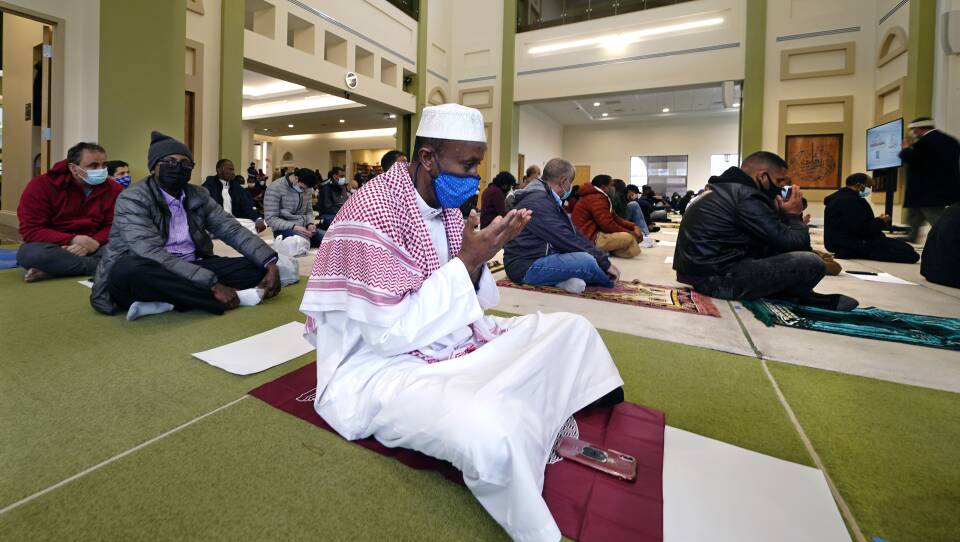A woman wearing a niqab — a cloth veil worn by some Muslim women — was refused service by a clerk at her Boston-area post office last year. A neighbor of a Muslim family filed a police report alleging they had hacked into her electrical appliances because “people like them” know how to. A Muslim teenager with disabilities was punched, causing her to fall down the stairs of her suburban high school.
These were just a few of the instances of discrimination Muslim residents of Massachusetts encountered in 2021, according to an annual report from the Massachusetts chapter of the Council on American-Islamic Relations.
In 2021 CAIR-MA had 163 requests for legal assistance related to hate crimes, harassment, bullying, employment and housing discrimination. Among those complaints are prisoners concerned about religious freedom issues, and calls about police harassment toward members of the public.
That’s a decrease from before the pandemic, when the organization received an average of 240 calls annually, but CAIR doesn’t think that’s because there are fewer incidents of harassment, discrimination and hate crimes.
“I think that COVID is a reason we've gotten fewer requests, not because all of a sudden there's no Islamophobia going on in the commonwealth,” said Barbara Dougan, legal director at CAIR-MA.
While the overall number of calls decreased, the group noted that most calls about harassment related to housing and neighborhood issues. CAIR-MA said that's likely because people spent more time close to home.
“I believe we're going to need to start gearing up because we're about to probably see a flood [of reports] come in," said Nichole Mossalam, director at the Islamic Cultural Center of Medford.
The annual report recounts multiple situations of Muslim customers being discriminated against.
One is of a fast food restaurant initially refusing to wait on a Muslim woman and her children, then adding strips of bacon to the 7-year-old's fish sandwich. Consumption of pork is considered forbidden in Muslim faith. CAIR intends to file a discrimination claim against the restaurant.
In the post office scenario, CAIR said a female clerk “angrily refused” to wait on the Muslim woman. The customer assumed the clerk wanted to confirm her identity, so she offered to show her face and driver’s license. She was yelled at to go to the back of the line and wait for a different clerk, according to the report.
“When the police and Post Office officials arrived on the scene, the clerk ranted and swore about 'these people' and said she couldn’t be forced to wait on 'someone like that,'’ the report said.
Muslims are also targeted in their homes. In one instance, the report said a family received a copy of a “self-proclaimed Islamophobe’s book at their home, with slurs written on the cover.” Local police and CAIR-MA became involved.
As schools returned to in-person classes, the bullying and education discrimination cases jumped back to pre-pandemic numbers. Along with the Muslim teenager with disabilities who fell down the stairs, a college instructor allegedly shoved a student.
“The instructor acknowledged the physical contact but claimed he had only 'tapped' her,” read the report. The school placed thenstructor on paid leave while investigating the complaint, but decided there was no discrimination involved.
And requests from Muslim prisoners have more than tripled, with some saying guards destroy or lose religious materials.
“Our report demonstrates that while there have been some positive developments, Islamophobia continues to present a threat to Massachusetts Muslims,” CAIR-MA Executive Director Tahirah Amatul-Wadud said in a statement.
In addition, Mossalam said there are instances of anti-Muslim hate that aren’t in the report.
One, she said, involved a preteen was bullied and assaulted. Police, Mossalam said she’s found, often don’t take detailed reports on hate-related situations.
The boy’s family reached out to her when he was jumped by school bullies during a home break-in, beaten severely, and the family’s property was stolen.
“His head was pounded into the side of the car and on the edge of the sidewalk's curb,” said Mossalam, “None of this was in the report. It just simply said that there was an altercation, and there was absolutely no follow up.”
The preteen had multiple visits to a hospital emergency room for a severe concussion because of the attack and has severe PTSD. Mossalam said there wasn’t any follow up from the local police until after the bullies sent death threats and she intervened.
“We can't get desensitized to the fact that this is an absurd amount of the kind of trauma and aggression that's being leveled at Muslim communities,” said Nadeem Mazen, president of JetPac, a nonprofit that trains Muslim Americans to run for public office. He views the abuses as systemic.
“What’s your solution going to be when the fabric of the society Is perpetuating this outcome?” he asked. Mazen said addressing anti-Muslim hate can happen on two levels: enabling and supporting people to seek redress for the wrongs against them, and fundamental social change.
To address the latter, Mossalam said her organization holds community discussions where people can meet their Muslim neighbors. She estimates there’s at least a couple thousand Muslims within the North Shore area.
“We need to do more about awareness and inclusivity and pulling in those types of people who have those misconceptions,” she said.








